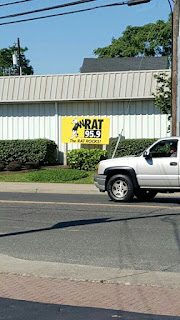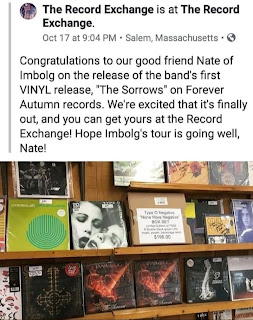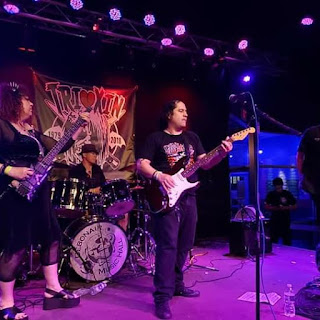Behind the Booth: an indepth look into the world of the DJ Featuring interviews with DJs Ian Fford & Alex Von Nihil
As you probably guessed, this entry is dedicated to the DJ or Disc Jockey. Technically they are not musicians, however they are a big part of the music industry and club circuits. They can also help further a musical artist's career by playing their music on their show or during their club sets. So it's a good a idea for bands to work along side of and cross promote Djs (as I stated in the past the business is give and take, you should help those when you can). I mentioned in previous entries most radio play is handle through a radio promoter, however it is in most cases ultimately the Dj that decides what songs get airplay. Like musicians, these Guys and Ladies usually focus on a specific genre of music and in many cases develop a style and personality to add flair to their overall appeal. In some cases have even established a certain "rockstar" status by making a name for themselves after years of spinning at events geared towards the genre they chose to spin. For those who may think that they are simply pressing some buttons and playing other people's music, this is certainly not the case. A Dj can make or break an event by having a sense of what the crowd wants to hear (which goes beyond simply taking some requests) in order to keep the crowd dancing. Djs also need to develop skills such as Beat Matching creating a well rehearsed set list of songs that are appropriate and the same or relatively close in sound and BPM (Beats Per Minute), and most certainly have to keep abreast of new music that is becoming popular.
I for one have not Djed before, however I have been researching the skills necessary to become a DJ and maybe one day you may end up seeing me a take the leap from the stage to the DJ booth. I have also been taking note of specific traits of certain Djs. For example, years ago I noticed that one DJ that was a Resident (meaning the permanent Dj for a particular weekly or monthly event) would always end his set with the song "Once in a lifetime" by Wolfsheim so often in those days that My friends & I knew that it was time to get ready to leave when we heard it. I even coined a new take on an old phrase by saying "It ain't over til Ian plays Once in a lifetime".
The Ian that I am referring to is none other than the legendary Ian Fford himself. Ian was kind enough to add his expertise in Djing to this entry (in order to prevent all of you from reading my blabbering on & on about a topic I am just learning about myself). I decided to ask Ian some questions about Djing, that may take the mystery out the magic of Djing. Here is what he had to say:
Nate: What made you decide to start djing?
Ian: "I started as a hobby, making mixed tapes for practically everyone. I was asked to do a "live mix tape" at a party, and it went from there. When I moved home from college, I ended up with a gig and have pretty much been spinning ever since.
Nate: Types of music do you spin?
Ian: "These days I play Techno, Club House, Trance and still play at alternative parties playing EBM, Synthpop, and 80's."
Nate: What do you listen to?
Ian: "Almost everything. Depends on the mood. Anything from Bach to The Cure, Dance Music to Ambient. Oldies, new stuff, reggae… you name it, I give it a try. I'm not too fond of most current pop music as the formulas have become even more predictable than ever, but some of it lends itself to good remixing."
Nate: What are your methods of working a floor to get people dancing?
Ian: "Tough question since its mostly by feel. I have to sense where the energy is at the time I start. If its early and quiet, then I play either something laid back so people can drink some, or requests. If its already busy, I start where the party is and move it in my direction."
Nate: How have changes in technology effected how you dj?
Ian: "I've always been the first kid on the block with new DJ technology. I had the first dual CD player in my area, and started early in the laptop DJ game. I find that these have expanded my ability to deliver a good performance. Its important to me, though, that I started with vinyl and CD mixing because there's a certain 'human' feel to beat matchin that straight-up computer mixing lacks. I like to keep the energy feeling organic. Digital music delivers unprecedented access to new music, its both overwhelming and indispensable. Instead of 4 crates of records, I can now bring a hundred thousand tracks to a club and find what I want instantly. Strangely, even with that much music, I very often get requests that I don't have. so internet access allows me to buy tracks while I'm live, and that's pretty cool."
Nate: What equipment do you use currently?
Ian: "I'm spinning with Traktor 2.6, a Hercules RMX that I've tweaked to run 4 decks and all effects. Sometimes I use a Novation Launchpad and slave Ableton to Traktor, but that's tricky so I don't do it often.
Nate: How do you discover new music & how do you decide what new music to include in your sets?
Ian: "The usual - YouTube, promos, blogs. radio, internet radio, live shows, word-of-mouth, random searches. These days its like going to a candy store - you can't eat all the candy, you can't even taste all the candy, so you just try what you can and see what you like… and listen to others tell you what they like.
Nate:What are some of your favorite events & places you have spun in the past?
Ian:The Bank, Mother, Webster Hall, Downtime, Splash, The Pyramid, Club Hell(Providence), Club 2686 (Levittown) and all top the list of favorite venues. The last night of The Bank was the best party ever! Brazil and London are fun because I'm not from there so I can do what I want"
Nate: Cant't argue with that,I was at the last night of the Bank too. Most Djs do not focus on stage presence, but I've noticed you have an interesting look, how did you create it?
Ian: "Once I realized I look best in white, it was easy."
Nate: What advice can you give anyone interested in or just starting to spin?
Ian: "Learn to mix without the computer doing it for you. If you're serious about it, keep at it because your opportunity will come. Don't be discouraged when you have a bad night, just take the bad with the good. Love what you're doing and people will sense that."
Well, there you have it from a veteran Dj, Thanks for your time Ian. I hope this next Dj read what Ian said and took some notes. He is a newer Dj on the scene and I felt it was a good idea to get his perspective for those of you just starting out or thinking of beginning to Dj. His Name is Alex Von Nihil, who you may know from DeadAudio.com and their NYC events.
Nate: What made you decide to start djing?
Alex: Kind of a difficult question. I think ever since I started attending the goth events and realizing that there are actually people who listen to the same music I do and organize parties for it, (in turn introducing me to new bands) I really felt like I could bring something to the table. And while you're behind those decks, you kind of have the crowd under your spell, so to speak and you, in a way control the room.
Nate: When did you start Djing, and who taught you to spin?
Alex: My first actual gig was a DeadAudio.com live broadcast on Superbowl Sunday in 2013 that Emily Anne Smykal aka Dj Decapatatrix invited me to, which answers your next question, Emily was the one that taught me. My first actual live gig in front of a crowd was May 9th Velocity at Gussy's bar (The 2nd to last one we had there before we moved to Delancey)
Nate: What type(s) of music do you spin and at what events have you spun?
Alex: At Velocity I usually open with goth, deathrock, and darkwave, sometimes throwing in some indie so I tend to get a bit experimental. When I do prime time or post-prime time I usually play a lot of old and new industrial, ebm, and anything on a fast and heavy side. at Fiend and Waveform I played a lot of punk and new wave with and old school goth. But I've been venturing outside the scene lately spinning between bands at Lacey Allure's Shake rattle rock & Roll where I spin mostly rockabilly, punk and some oldies.
Nate: What are some of the hardest things about being a new dj have you encountered?
Alex: "The hardest thing about being a new DJ I'd say is probably knowing exactly what to spin and when to keep the crowd moving. As I've mentioned before, you're the one keeping the floor alive and moving but you have to balance between keeping it fresh and yet at the same time not too surprising. At times your next song can clear the entire floor, and at times, it can get more people up on their feet. It's always an experience"
Nate: What events and cities do you hope to spin at in the future?
Alex: "Hmm the events I'd want to do one day? I've just done Arkham which is one of my favorite parties in New York and the first one where I began to make friends, which was great and very successful. In the future I'd maybe like to do Defcon and Necropolis. Also I love the idea of spinning between bands which is what I do at some of the events. Not sure which cities since I have not yet ventured outside of NYC but I get invites from folks in California which look quite enticing.
Well there you have it, I hope this gave you a more in depth look into Djing and maybe inspires you to give this art a spin (no pun intended). For the music video this week, I chose a song that was selected by request earlier in the week. Special thanks to Dj Ian Fford, Alex Von Nihil, Dj Decapatatrix, Dead Audio,Dj Dahlia, & Flashbang. Maybe i'll see you at the club tonight. Wherever you end up, have fun & be safe and look out next week for a very special entry. . Enjoy the rest of the weekend,Nate
And of course the track I will always associate with my days of dancing at Albion to Ian Fford's set.
And another request for the Metal crowd:







Comments
Post a Comment